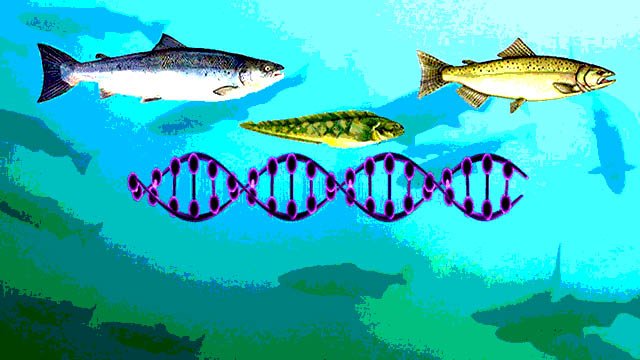By Shicana Allen
A newly released scientific report reveals yet another disturbing concern when it comes to the genetically modified salmon that the U.S. Food and Drug Administration is threatening to approve soon. Apparently, not only are Atlantic salmon and wild brown trout (a near relative of salmon) able to mate and create a genetic combination of the two species, but these hybrid offspring apparently grow even more rapidly than the GM salmon themselves (already designed to be excessively large). And this could cause big problems for the free-swimmers in their natural habitat.
According to this latest research, results indicate that the GE salmon/wild trout mix would have a competitive advantage over other fish should they escape into rivers and oceans. Since they would grow 80% faster and have increased appetites, these super-fish could voraciously consume much of the available food, causing other wild fish to end up being far smaller.
States Dr.Krista Oke, the lead author: “If this advantage is maintained in the wild, transgenic hybrids could detrimentally affect wild salmon populations.” The Atlantic Salmon Federation, along with a number of other environmental and wildlife groups, have already expressed grave concerns about how natural fish ecosystems could be disrupted should these new, super-sized salmon accidentally escape into the wild.
Unfortunately, the FDA’s advisory committee for the salmon is stocked with biotech company advocates (including an ex-Monsanto employee), and the approval of this fast growing fish could open the flood gates for countless other GMO animals in the U.S. marketplace.
Consumers wary of Frankenfish dangers to the environment and to your health can assist in blocking FDA approval in a number of ways, including educating others, signing this petition, and calling your Congressmen. Another important strategy is to inform your local supermarkets that you will refuse to purchase this product, and ask them to sign this pledge letter that they would refuse to carry GE salmon in their establishments should it gain FDA approval. In addition, please read our urgent Call to Action.
Shicana Allen has been a health, environmental, and food safety advocate, writer,and public speaker for over 20 years


